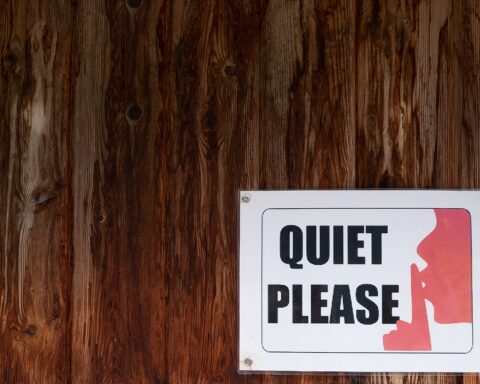Taken from “The Sayings of Light and Love” is a saying I found on silence. Saying 100 reads, “The Father spoke one Word, which was his Son, and this Word he speaks always in eternal silence, and in silence must it be heard by the soul.”[1]
Brother John of St. Samson says, “Silence and solitude are brother and sister, who offer each other a helping hand for their mutual protection.”
Solitude is sought to keep silence more easily and perfectly, and it is by silence that we come to retain our solitude amid the world.[2]
There must be internal silence since external silence does not suffice.[3] Logically, what profit is there in making a big deal out of solitude and silence in external surroundings and yet have no intention of quieting ourselves internally?[4]
This is why there is wisdom in using the morning hours to pray. At the beginning of the day, there are fewer distractions. The day is fresh, and events have not yet made any noise or commotion that could disturb our quiet. In other words, there is much less to quiet down in ourselves.
Again, more than just being quiet externally is needed. It is more important that there is an interior silence. While external silence might be near impossible in some environments, it should always be sought out as much as possible. Outward silence should always be sought out because it helps interior silence and can lead one to it. “The love of silence leads to the silence of love.”[5]
An example of this would be waking up in the quiet of the morning, and instead of entering quiet prayer, I decided to read or watch the news. By letting outside things in, I am already disturbing that quiet.
In 2003, the long-awaited sequel to The Matrix was released. I actually went to the movie that would be showing the preview to see it on the big screen. A few ladies were still speaking when the previews started, and I remember hushing them.
As one who has taught in the classroom for years and still in the Religious Ed classes, I find it challenging to teach while students have their own conversations. It is difficult when multiple kids are shouting out questions at the same time. I have had to tell them to settle down and that I can only listen to one person at a time.
What is true of the need for others to quiet down for us to listen or pay attention holds for the person’s faculties.
The external senses
The imagination: in it can be random thoughts, memories, or daydreaming.
The will: it is up to the will to direct whatever floats into the imagination. By the will, we make the movement to detach from all things that are not God, making that silence the best we can or retreating to a state or place of solitude.
The book ‘The Spiritual Doctrine of Sister Elizabeth’ says, “that a soul which listens to self, which is preoccupied with its sensibilities, which indulges in useless thoughts or desires, scatters its forces. It is not completely under God’s sway. Its lyre is not in tune, so that when the Divine Master strikes it, He cannot draw forth celestial harmonies; it is too human and discordant.”[6]
I used a similar illustration when discussing the Gifts of the Holy Spirit. Even though God can accomplish whatever He wants in us, is there any way to be better disposed to the Holy Spirit working through us? The life of the virtues and our daily pursuit to grow in them, is one way that we make ourselves better disposed for the works of the gifts to happen. Again, God can do anything with us, yet sometimes He works with what we give Him. Our virtue does not have any power to add to the Holy Spirit’s gifts; instead, our virtue keeps the lyre in tune so that when it is struck, it brings forth harmony instead of harsh sounds.
With the effort to find solitude and silence comes the effort to pray. The silence being spoken of is sought out for this reason. It is harder to pray in a place with conversations going on or other types of loud distractions. It is harder to pray when the head is full of the day’s events or other thoughts.
The lesson is that if we don’t treasure silence, it does not become a priority nor something we strive to safeguard. I think the same is true of prayer. If we do not treasure prayer or love it, it becomes less and less of a priority the more challenges we face.
When prayer becomes less of a priority, the way we pray when we do can be affected. Yes, it is good if we are praying out of obligation, but it doesn’t say much if that is the only reason.
There is a reference to Elizabeth of the Trinity from the book on her spiritual doctrine, “Above all, she loved the silence of her cell, which she called her ‘little paradise’ and in which she delighted to take refuge. “A straw bed, a little chair, a wooden table; there you have the furniture. But it is full of God and I spend such happy hours there, alone with the Bridegroom. I keep silence; I listen to Him; it is so good to hear everything from Him … and then, I love Him!”[7]
Prayer is where we can do that: to keep silence, to listen to, and to love Him.
Here are the notes from the talk given in December of 2023 to THE COMMUNITY OF THE HOLY INNOCENTS Secular Order of Discalced Carmelites, Rockford, Illinois / I try not to read from my notes so the actual talk given likely contained examples and content not found here.
[1] St. John of the Cross. The Collected Works of St. John of the Cross (includes The Ascent of Mount Carmel, The Dark Night, The Spiritual Canticle, The Living Flame of Love, Letters, and The Minor Works) [Revised Edition] (p. 147). ICS Publications. Kindle Edition.
[2] The Carmelite Directory of the Spiritual Life, CreateSpace Independent Publishing Platform (April 19, 2014), pg 361
[3] The Carmelite Directory of the Spiritual Life, CreateSpace Independent Publishing Platform (April 19, 2014), pg 362
[4] The Carmelite Directory of the Spiritual Life, CreateSpace Independent Publishing Platform (April 19, 2014), pg 362
[5] The Spiritual Doctrine of Elizabeth of the Trinity, The Newman Bookshop; First Edition (January 1, 1961) pg. 36
[6] The Spiritual Doctrine of Elizabeth of the Trinity, The Newman Bookshop; First Edition (January 1, 1961) pg. 41-42
[7] The Spiritual Doctrine of Elizabeth of the Trinity, The Newman Bookshop; First Edition (January 1, 1961) pg. 37
Discover more from Sanctus Daily
Subscribe to get the latest posts sent to your email.




